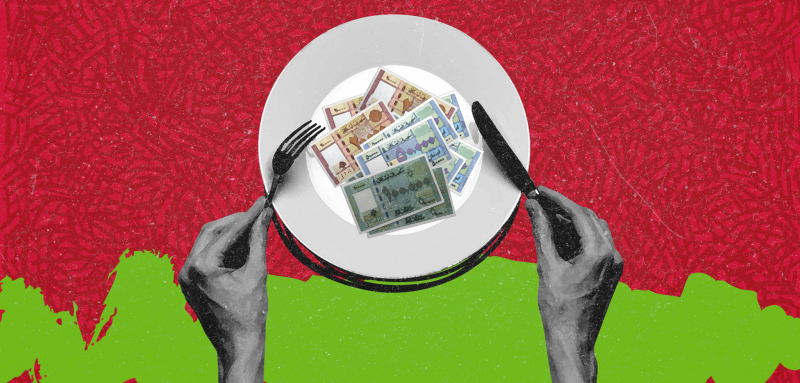“Life changed in such a way that words fail me. The change did not take place overnight – it did not come from just one side. We are witnessing it daily through many events, all is turned upside down and we are supposed to accept it. I woke up one day and did not find the world I was living in, and in some irrational way, I am still searching for it.”
Before 2020, Lina, 28, had a normal life – splitting her days between Beirut and the South – she had a stable job that paid for housing and daily expenses. Lina was also completing postgraduate studies in life sciences, and paying for the degree through her own earnings. Lina’s life as she lived it ended with the total economic collapse in Lebanon: “Well, the collapse affected everyone; it wasn’t my own collapse. I can cope with not leaving the house because of the pandemic, or not spending my money on nights out and partying. I can even accept that I will not complete my postgraduate studies – I’ll just consider that this goal of mine is not an essential in life, although it was supposed to secure the future I had always dreamed of. But what I cannot accept is my inability – along with everyone else’s – to buy our basic needs, specifically food, I had to actually change my diet due to the financial collapse.”
I can cope with not leaving home due to the pandemic, or not spending money on nights out. I can even accept not completing my postgraduate studies. What I can’t accept is my inability, and everyone else’s, to buy basic needs, specifically food. #Lebanon
Hour of Judgement
Last week, the exchange rate of the dollar reached 9,400 Lebanese Liras. In turn, essential food prices began to rise along with everything else. Every time the value of the Lebanese currency weakened, shopkeepers would raise their prices. People would stand in front of a product, read a specific price, but when the time for check-out comes, they are surprised that the price is not as marked on the shelf or the item istelf. Here, the cashier begins to explain what happened, “The price of the dollar went up today, so we changed the prices. It has nothing to do with me.”
Of course, this is where the contention begins: some customers demand that the establishment sell them the product according to the listed price, while others just leave the product behind. On one occasion, a father had to leave behind the candy that he was going to buy for his children, in order to keep the bags of rice and sugar in his cart. Another time, I saw a woman asking the cashier to stop ‘ringing up’ her items as soon as her bill reached 300,000 Liras. This was after she had sorted her items from most important to least important. The woman had to leave more than half of her purchases in the basket, to carry the little that she could afford to buy and leave the store with apparent anger on her face.
In one of the hypermarkets, I had made a secret agreement with the employees there. When I go to the store to buy my weekly needs, they give me the “coupon” that they usually get from their establishment so that I can use it, and in return I give them the cash they need for other things, such as buying medicine or for transport. Recently, an employee told me, “Yesterday I received the electricity bill, so please buy two vouchers from me instead of one, and I will help you get the best food products.” Indeed, this is what happened, and that is when I discovered the secrets of the hidden meat, fruit, and vegetables that aren't offered to everyone, acquiring them at a lower price than those available to everyone else. Thus, a secret war began between me and the employees against the establishment that’s robbing people. It was setting prices to its own whims since it is not being subjected to any consumer protection and oversight – just like most other institutions that are exploiting the crisis in order to make a quick lira.
The employees and I divide the process of buying and selling the “coupon”. Every week, it’s one of the employees’ turns, and the whole process is according to need, necessity, supply, and demand: one week for meat and another for fruit and vegetables. I stand in front of the grocer in charge of the fruit and vegetable section, and ask for one kilogram of tomatoes, for example. He puts them on the scale, and sticks the price for 700 grams on a bag that weighs a kilogram. I buy the coupon from him, and he tells me that he will use the money to go out with his friends, while I tell him that I am a failure when it comes to cooking and therefore do not know how to use tomatoes except to prepare a salad! I then head over to the cashier section without the slightest feeling of guilt. I stand in the long line, watching the people around me consumed by stress and tension, and I feel that we are all standing in the day of Judgment.
This country that we live in has turned us into people that have to be selective even in the food we want to eat, and are afraid of the process of buying basic needs. The women standing in front of me exchange recipes that do not require meat, while another says to her husband, “Let us return this, when the bank gives us our next cash quota, we’ll come back and get it.”
In a side conversation on the corner of the road, a woman tells me, “I worked all my life as a university professor – my husband did too. We are a financially well-off family, but we are currently unable to get our money from the bank. Now, while we are in the later years of our life, we have to calculate the meals and ingredients that we can buy, because the prices have become crazy. Why does a lemon cost 1,500 [Lebanese Liras]?” She goes on to say, “With the money that we get, we have to buy our medicine, of which half are not even available in the country. So, we gave up tasty and delicious food, and began to eat to sustain ourselves. The only thing I can say is thank God, since on our way here I saw destitute people from our age group searching for food in the trash can.”
We both worked as university professors all our life, we’re a well-off family but can’t take cash out of our bank. We now must calculate the ingredients we can afford, prices are crazy. Why does a lemon cost 1,500LL?
Each Bite is 2,500 Liras
“I isolated myself for a long time from outside news and the general situation, and when I went back to following-up on events, I became depressed. I still believe that there is a way out of the current situation, and that the country has not completely ended yet, but we will need a great deal of time. All I want is that – up until the moment we come out from the bottom of ruin – to not see any more blood,” Mansi says, (a pseudonym Mansi selected for himself, meaning the forgotten).
Last night, Mansi sat in front of me and expressed his joy about a new project he has undertaken. It would secure him 100 dollars next week, which he would use to pay rent. When I asked what shocked him the most with the high prices, specifically those related to foodstuffs, he said, “Cheese. This country does not have a local industry, but a few days ago I bought 10 slices of ‘kashkaval’ cheese, and I was shocked that their price was close to 25,000 Lebanese pounds, and something very strange happened: When I ate one piece, I did not realize that, at that moment, I was chewing 2,500 liras. The food was transformed from something you take for granted, a pleasure, and a need – from merely being food, into a complex financial transaction with each and every bite taken.”
I recently bought 10 slices of Kashkaval cheese and was shocked by the 25,000 LL price tag. When I ate one, I realized I was chewing 2,500 LL. For most Lebanese, food was transformed from a basic human need to an unaffordable financial transaction
Residents of the same building have started sharing cooked meals in order to sustain their bodies. There are those who are no longer able to secure the normal things taken for granted, and behind all this lies a state that holds banquets and honor ceremonies inside its palaces as it wages a war on its people on the streets.
Every day, we see new, helpless faces reaching out with their open palms – asking and demanding for food, not money. I now remember the university professor that used to go on about the days of civil war and its woes. Nowadays he is saying: “During the civil war, we did not live the humiliation we are living today.”
رصيف22 منظمة غير ربحية. الأموال التي نجمعها من ناس رصيف، والتمويل المؤسسي، يذهبان مباشرةً إلى دعم عملنا الصحافي. نحن لا نحصل على تمويل من الشركات الكبرى، أو تمويل سياسي، ولا ننشر محتوى مدفوعاً.
لدعم صحافتنا المعنية بالشأن العام أولاً، ولتبقى صفحاتنا متاحةً لكل القرّاء، انقر هنا.


